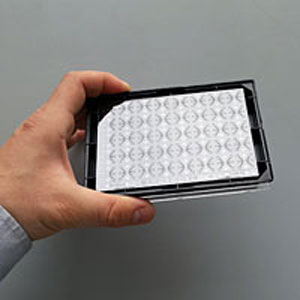| Jul 05, 2012 |
Launch of organs-on-a-chip
|
|
(Nanowerk News) Hundreds of micro-organs mimicked on a chip, with minuscule channels that serve as blood vessels. These devices can raise drug development to a new level and reduce animal testing. Leiden researchers and their spin-off company Mimetas are set to launch their ’organs-on-a-chip’, backed by a 200,000 euro subsidy from STW.
|
 |
| Cells (middle channel) growing inside a Mimetas three-dimensional culture plate. Each channel is about two human hairs wide.
|
|
Revolutionising drug development
|
|
'We mimic human organs in a microscopically small space,' explains LACDR researcher and Mimetas co-founder Paul Vulto. 'These organs-on-a-chip can be used to determine the efficacy and toxic side-effects of new medicines better and faster. They provide a unique, novel bridge between traditional laboratory tests and clinical testing in patients. Showing closer resemblance to humans, they have the potential to revolutionise therapeutic drug development and save many laboratory animals at the same time.'
|
|
Personalised medicine
|
|
A prototype of the Mimetas three-dimensional culture plate for 35 experiments. Plates of the same size for thousands of experiments are under development.
|
|
One Mimetas device fits hundreds of micro-organs in which tiny microfluidic channels act as blood vessels. Currently, Mimetas develops its products to help pharmaceutical companies make better medicines at lower costs. Ultimately, Mimetas products will be used to select the best therapy for individual patients, based on direct testing of drugs on diseased cells, so-called personalised medicine.
|
 |
| A prototype of the Mimetas three-dimensional culture plate for 35 experiments. Plates of the same size for thousands of experiments are under development.
|
|
200,000 euro subsidy
|
|
Mimetas is the result of research and business development efforts by Paul Vulto, Thomas Hankemeier and Bas Trietsch from the University of Leiden and biotech-entrepreneur Jos Joore. Research has been performed within and with support of the Division of Analytical Biosciences and the Netherlands Metabolomics Centre. the Dutch Foundation for Applied Sciences (STW) has awarded Mimetas a subsidy of 200,000 for bringing the 'organs-on-a-chp' to the market.
|


